QuestionHi.
I'm confused. I have a 6 month old Yorkiepoo. I have had him two months. He pees outside 99% of the time. Pooping is another thing. He will go outside for a day or so with no problem after I feed him twice a day. Sometimes there is a third one that seems to have no warning and other times he'll just go once. It's hard to get a handle on. I feed him twice a day and take him right out. But the real problem I have is that for a day or so he will not go outside no matter how long I stay out there. I sometimes stay out there for ten minutes and go in, wait a half hor and go back. He will avoid areas where he has pooped before like its toxic. I clean it up every day, so there are no piles around. I also have left one or two piles with same result. It's almost as though he simply makes up his mind that he won't go outside. He'll come right in and go in the same area. I have cleaned the area with stuff that supposedly removes smell, I have caught him and tried to stop him, but he just gets all excited and runs. I have scolded him vocally and took him out immediately, and he just goes out and snoops around looking for things to chew. He's driving me nuts. It makes no sense that he is willing to go outside one day and yet treats the yard like hot lava the next 2 days. I live in a small home and I watch him all the time. I have had several dogs and have had no trouble training them but they were large dogs and tend to be easier to house train. I don't like the idea of having to keep this little guy confined to a small area for 90% of the day for 5 minutes of pooping. It's just frustrating. He hasn't been neutered. That is going to happen in a couple of weeks. He is healthy, otherwise a great little guy. I got him from a neighbor who got him from a breeder along with a sibling. This one is far more active than the other and they didn't get along a little bit. She asked if I wanted him because he kept biting the one she kept. He shows no sign of aggression, however. I think she just didn't want to deal with his personality. The one she kept is more like a lap poodle. very calm. I lost a ten yr old shepherd mix this May from cancer and love dogs, but this guy is a challenge and I need to get him trained. Sorry for the long post, but trying to give you as much as possible.
Thanks a lot for any help you can give me,
Mike
AnswerGreetings, and thank you for contacting All Experts!
There are many potential causes for the behavior you are seeing, so I will try to address several in hopes of not overwhelming you. First of all, you own a breed that is not the easiest to potty train, Yorkshire terriers are known to have a stubborn streak that becomes quite visible in the process of potty training. Poodles, on the other hand, are much easier but with a mixed breed, you never know what part will prevail. At six months, a dog should be for the most part house-trained however, accidents may still happen.
One thing to consider is diet. If you are feeding cheap foods from your supermarket, these will yield more frequent and bulkier bowel movements. For this reason, a premium dog food even though more expensive is much preferable, more nutrients are absorbed and there is less waste. This means smaller stools and on a less frequent basis. Always switch foods gradually over the course of at least one week. You can read more about the advantages of premium foods here:
http://www.petco.com/Shop/ShoppingGuides/ChoosePremiumDogFood.aspx?ShoppingGuide
Another consideration is health. There are some disorders which can cause an increase in bowel movements. Some intestinal disorders may cause a sense of urgency with frequent stools which may be hard for your yorkiepoo to hold on to until he is let out. Intestinal worms are also a cause for more frequent bowel movements and something that should be ruled out. All dog owners should have their dogs' stools checked for parasites at least once a year.
If you are already feeding a premium food and your dog is healthy, then consider this to be a potty- training issue, especially if he was never fully potty-trained. Instead of taking your dog out and waiting for him do business, it may work better to take him for a walk. Movement is known to elicit bowel movements in dogs. This should also prevent him from looking for things to chew on and wasting time. It will benefit him as well so he can keep up with his needs for socialization and exercise. Not to mention, it will allow him some cleaner turf to walk on, some dogs are sensitive about walking on areas where they pee and poop and your dog seems to fit the picture.
I understand your reluctance to keep him crated or in a small area if he is well house-trained for most of the time. An alternative may be to keep him on an umbilical cord. This means you would keep him on a leash kept clipped to your belt so you can keep an eye on him and recognize signs he may have to go outside. Upon recognizing those signs you may therefore pick him up and take him immediately out. If he goes outside, of course, be ready to immediately praise lavishly and give a treat.
Something that may help you and keep him focused on doing business it to put the action of going potty on cue. In other words, you will train him to go potty on command. Here is how to teach this:
You can teach your dog to potty on cue by taking your dog to his usual potty place. Watch him very carefully and right when you notice he is positioning himself to relieve himself say ''go potty''. Timing is of the essence; you want to be precise enough that when you say ''go potty' your dog is actually urinating or defecating. Immediately after going potty say ''good boy'' followed by a treat. The cue will help your dog associate the command with the action of peeing and pooping, while the treat will make your dog more eager to do business. This is positive reinforcement training, therefore it will increase the chances the behavior will repeat with time.
Repeat this every time your dog is taken out and goes potty in the same area. At some point, you may no longer have to wait to see he is about to go, your words ''go potty'' will be enough to cause him to automatically do his business. Remember to always praise and reward for going potty outside!
I understand your frustration; house-training can be quite a tedious job, especially when the wanted results are not obtained as wished. The good news, is that once a dog is fully house-trained there are very a small chances for regression. I hope this information has helped you, my very best wishes and kind regards,
Adrienne Farricelli CPDT-KA

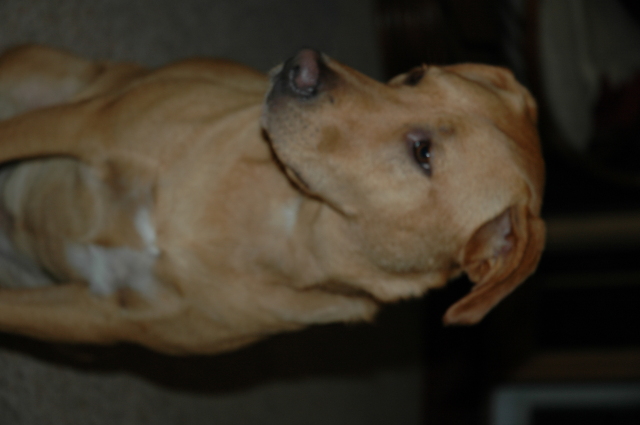 dog distraction/deer carcass
Question
ginger
Our dog is a mutt mostly Rhodesian Ridg
dog distraction/deer carcass
Question
ginger
Our dog is a mutt mostly Rhodesian Ridg
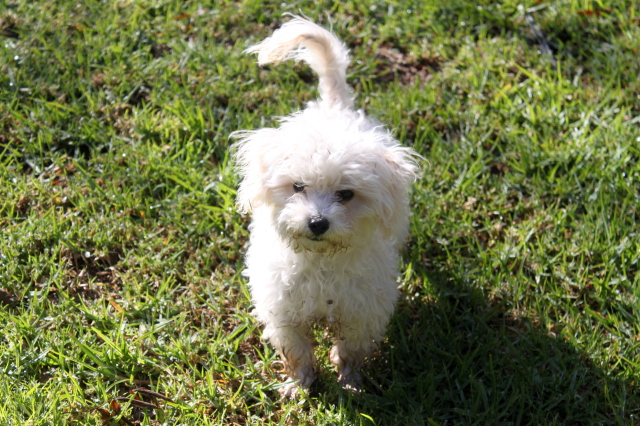 Young Moodle Trouble
Question
Moodle, male, 10 - 11
I have a two question.
Young Moodle Trouble
Question
Moodle, male, 10 - 11
I have a two question.
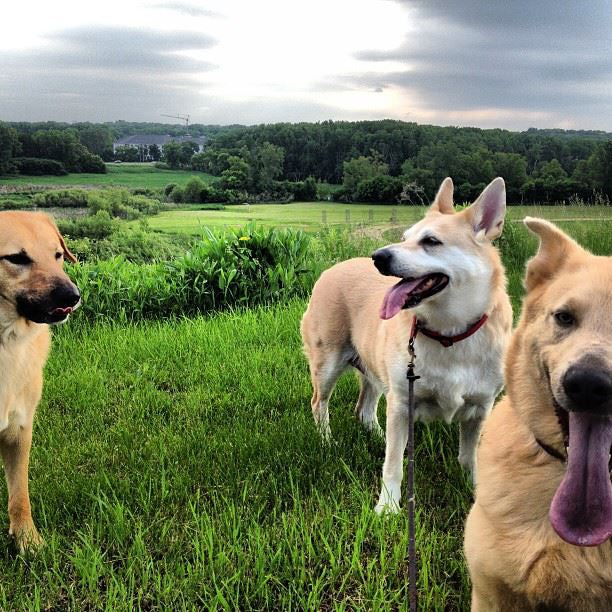 traumatic
QuestionI have a 6 lb Yorkie that is a rescue, weve had
traumatic
QuestionI have a 6 lb Yorkie that is a rescue, weve had
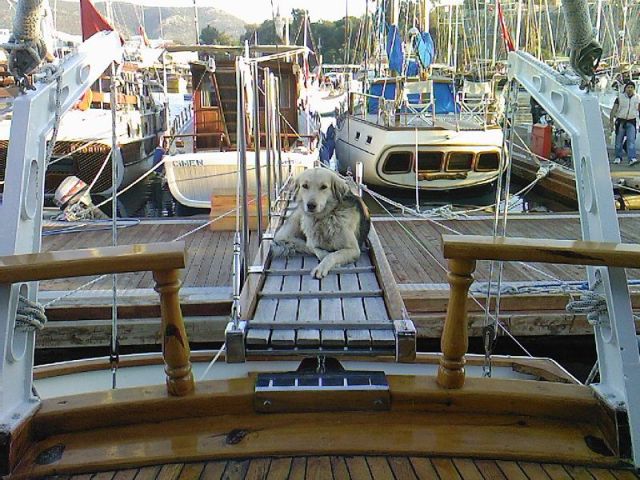 breed identification
QuestionMaggie
QUESTION: Hello - Ive hopped over
breed identification
QuestionMaggie
QUESTION: Hello - Ive hopped over
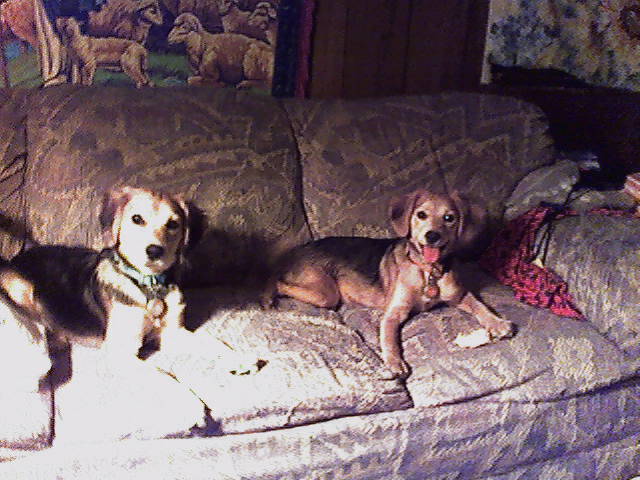 bladder issues in rescue pups
Question
collie-shepherd pups
We have had two rescued s
bladder issues in rescue pups
Question
collie-shepherd pups
We have had two rescued s